Magick flows through Mythas, shaping its people, lands, and history. From ancient arcane practices to forbidden Void Magick, discover the power that defines this world.
The world of Mythas is steeped in the arcane, where magick serves as both a boon and a bane. Scarred by the Divine Fall, the magickal fabric of the world is riddled with instability, creating zones of unpredictable power and forcing practitioners to tread very cautiously.
Let us explore the diverse and perilous magickal systems of Mythas, including Arcane Magick, Void Magick, Blood Magick, Ritual Magick, Sex Magick, Primitive Magick, and Alchemy, alongside unstable magick zones and the dire consequences of misusing these powerful forces.

Arcane Magick in Mythas is a volatile and dangerous force, deeply scarred by the Divine Fall, which eradicated divine magick and destabilized the arcane. Casting magick involves Weaving Checks to channel elemental forces through the caster’s Spirit. Failures can trigger severe Magickal Backlashes, causing physical harm, environmental destruction, or summoning hostile entities. Every spell risks Magickal Fatigue, further debilitating the caster.
Magick is rare, feared, and heavily regulated. Societal mistrust of practitioners often forces them into hiding. Specialized forms of magick include Void Magick, powerful but corruptive; Blood Magick, fueled by life force; Sex Magick, combining intimacy and power; and Primitive Magick, a natural, less-volatile alternative.
Magick in Mythas serves as both a tool and a narrative driver. It fuels societal conflict, shapes political intrigue, and offers high-stakes opportunities for adventurers. Players balance immense power against catastrophic risks, while Game Masters weave magick into their stories as a force of peril and wonder. In Mythas, magick embodies the essence of risk, reward, and the unknown, defining its dark and dynamic world.
Divine Magick in Mythas, once powered by Akasha—the spiritual essence linking mortals to the gods—ceased to exist after the Divine Fall. This cataclysmic celestial conflict annihilated the gods and destroyed Akasha, the energy that enabled mortals to channel divine power. As a result, Divine Magick, previously used for healing, protection, and miracles, became entirely nonfunctional.
The destruction of Akasha severed the connection between mortals and divine energy, rendering divine spells impossible. Despite attempts to restore this power through ancient artifacts, rituals, and celestial events, all efforts have failed. Mortals have been forced to adapt by relying on arcane alternatives or mundane methods, often at great peril.
The absence of Divine Magick has profoundly reshaped Mythas’ societal, religious, and political landscapes. Nations and communities once dependent on divine miracles for healing and protection now grapple with the fragility of their existence. This loss has fueled despair, innovation, and conflict, as people struggle to fill the void left by the gods.
The lack of Divine Magick stands as a haunting reminder of the Divine Fall’s devastation, symbolizing the fragility of reliance on higher powers and the consequences of a shattered divine order in Mythas.

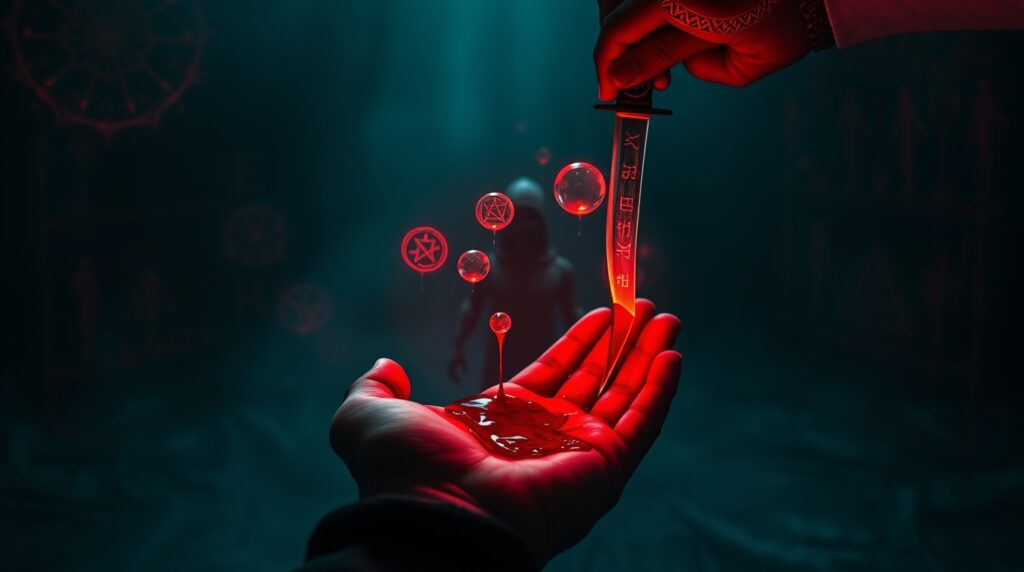
Blood Magick in Mythas is a dark and powerful practice, drawing energy from the life essence of living beings. It is deeply feared, outlawed in many regions, and associated with sacrifice, pain, and death. Despite its stigma, it remains a tempting tool for those willing to embrace its perilous cost for unmatched power.
Mechanics: Blood Magick requires the sacrifice of hit points—either from the caster or a participant. This reduces the Weaving DC of spells and amplifies their potency, such as increasing damage or extending duration. Larger sacrifices yield greater results, and rituals involving multiple participants can dramatically enhance spell effects. However, the practice always exacts a toll, inflicting fatigue and risking severe backlash, which can lead to physical harm, death, or the summoning of Shadespawn.
Historical Impact: Blood Magick has been wielded in desperate or ambitious acts, such as the devastating plague during the Eldkin-Human wars or the fall of Morath Keep, where defenders sacrificed themselves to conjure a fiery storm.
Narrative Role: It offers immense narrative potential, with moral dilemmas, societal ostracism, and conflict with anti-magick groups like HexHunters. Blood Magick’s potent rewards are always balanced by its grave risks, making it a compelling, high-stakes element in Mythas campaigns.
Sex Magick in Mythas channels intimacy to amplify arcane power, combining physical and emotional connections with spellcasting. Though not inherently evil, it is widely taboo and outlawed, practiced secretly by those seeking its unique benefits. Its use introduces themes of power, consent, and societal boundaries, offering potent rewards at considerable risk.
Mechanics: Sex Magick rituals require one or more participants who share their essence with the caster. This reduces Weaving DCs and enhances spell potency, such as extending duration or increasing effectiveness. Each additional participant further boosts bonuses, scaling the power of the spell. Unique to Sex Magick, backlash effects from failed Weaving Checks can be distributed among participants, mitigating risks for the caster but impacting the group.
Social Perception: Its forbidden status fosters tension and secrecy. Practitioners often face societal ostracism or legal consequences if discovered. In the Imperium, it is strictly banned, though some powerful individuals secretly use it for critical rituals.
Narrative Role: Sex Magick enriches gameplay by presenting moral dilemmas, societal intrigue, and relational dynamics. Its potential for collaborative casting and taboo nature make it a high-stakes choice for ambitious characters seeking extraordinary results at the cost of reputation and personal risk.
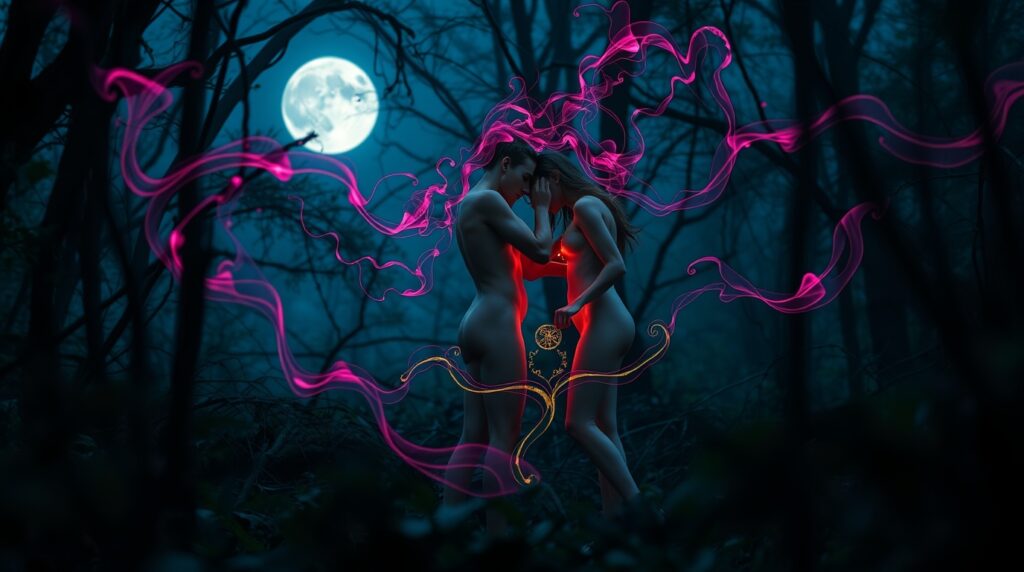
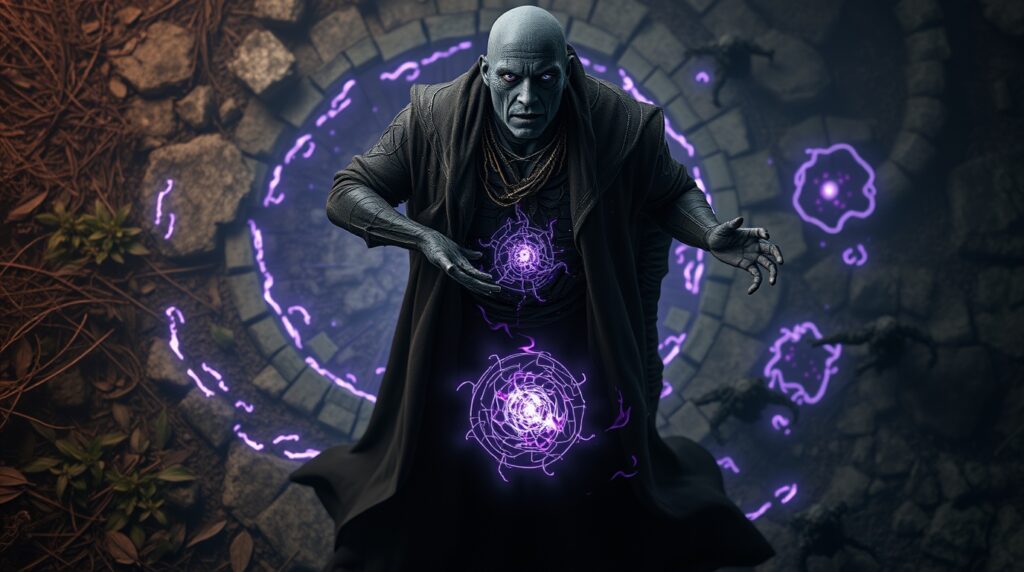
Void Magick in Mythas draws power from the remnants of the Void created during the Divine Fall, embodying destruction, corruption, and immense risk. It is the ultimate taboo, outlawed in most societies and relentlessly hunted by groups like the HexHunters due to its destabilizing and dangerous nature.
Mechanics: Void Magick requires a Weaving Check with a significant DC increase, along with mandatory sacrifices of vitality, such as hit points or levels of fatigue. Its spells can corrupt the environment, turning areas into Void-touched zones where magick behaves unpredictably. Failed Weaving Checks often summon Shadespawn or Blightspawn, with the caster facing severe consequences like permanent corruption or transformation into a Void creature.
Backlash and Corruption: Void Magick risks severe backlash, including necrotic damage, summoning hostile entities, or distorting reality itself. Prolonged use accumulates Corruption Points, leading to physical or spiritual degradation, culminating in irreversible transformations into Void-linked beings.
Social Perception: Feared and reviled, Void Magick practitioners face immediate persecution if discovered. Even rumors of its use provoke panic and swift action from anti-magick authorities.
Narrative Role: Void Magick creates high-stakes gameplay, blending immense power with moral and existential peril. Its forbidden nature adds layers of secrecy, fear, and danger, making it a compelling narrative and gameplay element in Mythas.
Ritual Magick in Mythas involves elaborate ceremonies to achieve powerful effects beyond traditional spellcasting. Rooted in cooperation, it requires multiple participants, rare components, and extended casting times, making it both potent and perilous.
Mechanics: Ritual Magick demands a minimum of three participants, with additional members enhancing the ritual’s effects and increasing the chances of success. Each participant contributes bonuses to the Weaving Check, amplifying aspects such as spell duration, area of effect, or potency. However, failures can result in catastrophic backlash, with the consequences distributed among the participants.
Applications: Rituals can summon powerful entities, alter weather, bless armies, or create massive environmental effects. Their large-scale impact makes them invaluable for grand-scale campaigns or dire emergencies but equally dangerous if mishandled.
Social Perception: Ritual Magick is a double-edged sword. While some societies revere it for its transformative potential, others ban or strictly regulate its practice due to the risks and potential for catastrophic failures. It is often conducted in secret or under strict supervision.
Narrative Role: Ritual Magick fosters collaboration and high-stakes decision-making, offering players a chance to undertake significant endeavors with meaningful consequences. Its versatility and risk make it a dynamic tool for storytelling, emphasizing the balance between power and responsibility.
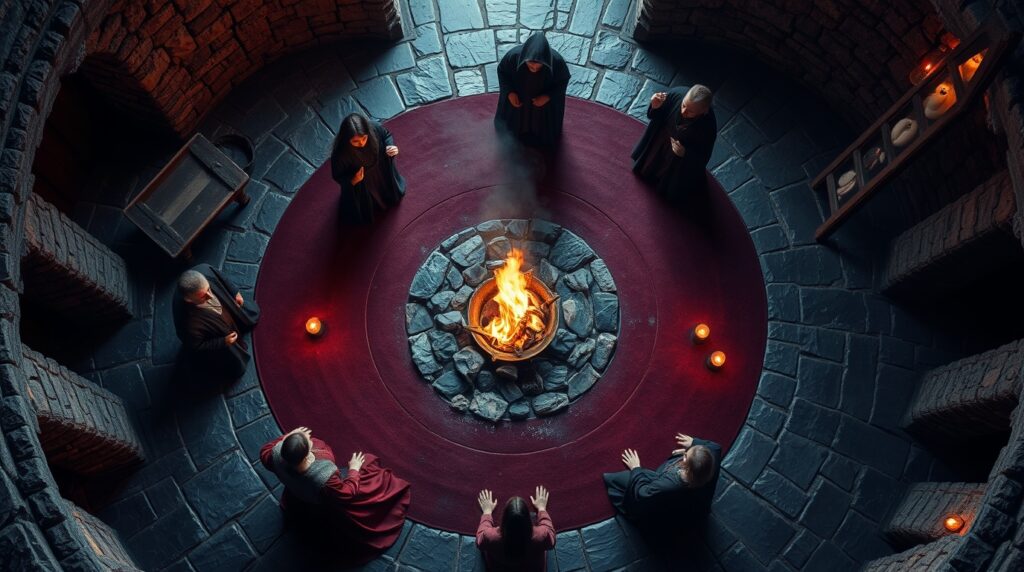

Primitive Magick in Mythas is an ancient, instinctive form of spellcraft rooted in the natural world and the spiritual energies of living beings. Practiced by shamans, druids, and isolated tribes, it predates structured arcane systems, drawing directly from elemental forces, ancestral spirits, and sacred sites.
Mechanics: Primitive Magick uses Nature or Occultism checks, fueled by Stamina Points (SP) rather than traditional spell slots. SP represents physical and spiritual endurance, with costs scaling by spell level. Practitioners can enhance effects through sacrifices such as material offerings or personal vitality. Group rituals further amplify power, adding bonuses to rolls and increased effects like duration or area of impact. However, Primitive Magick has a 10% chance of triggering Wild Magick effects, even outside chaotic zones.
Social Role: Respected and feared, Primitive Magick users often protect sacred sites or serve as spiritual leaders. Their practices frequently clash with the Imperium’s magickal suppression laws, resulting in persecution or exile.
Narrative Role: Primitive Magick introduces themes of sacrifice, collaboration, and connection to nature. Its unpredictable and localized effects create opportunities for creative gameplay and storytelling, emphasizing the untamed essence of Mythas and the delicate balance between civilization and the natural world.
Alchemy in Mythas bridges magick and science, remaining a reliable craft despite the Divine Fall. Unlike spellcraft, it uses natural elements and precise processes, making it accessible and stable in a world where magick is volatile.
Mechanics: Alchemy involves gathering and preparing rare ingredients, combining elements through extraction, infusion, and refinement to produce potent concoctions. Alchemical crafting uses the Craft skill, requiring tools and specialized knowledge. Failure results in wasted materials or dangerous mishaps. Products include restorative elixirs, explosive vials, antitoxins, and enhancement tonics. Advanced alchemy explores mutagens, elemental synergies, and the controversial Void Alchemy, which risks corruption and unpredictable outcomes.
Applications: Alchemy has practical uses in combat, exploration, and healing. It offers tools like explosive vials, breath draughts, and strength tonics, empowering adventurers without relying on unstable magick. Items like Phoenix Draughts or Everglow Lanterns highlight its potential for incredible feats.
Societal Role: Alchemy is respected for its utility but controversial for its potential misuse, such as poison crafting or unethical experiments. It serves as a vital trade and survival tool, particularly in frontier regions.
Narrative Role: Alchemy enriches gameplay with resource management, crafting challenges, and ethical dilemmas. Its blend of science and mysticism makes it an engaging, non-magickal alternative for players seeking versatility in a low-magick world.
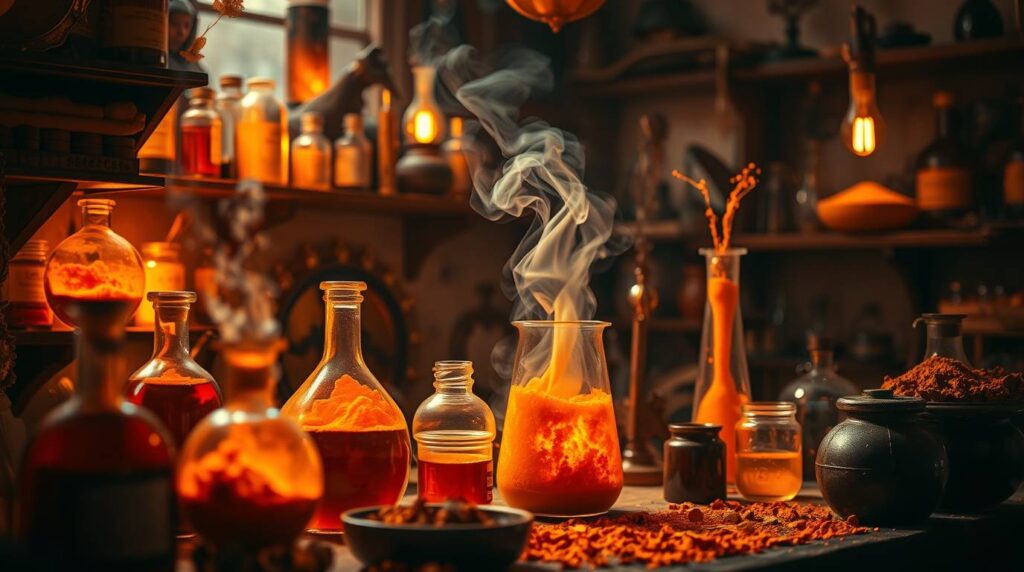
Whether exploring the forbidden Void Magick or mastering the elements, the magick of Mythas holds endless possibilities for adventure and discovery. Where will your journey take you?
In Mythas, we use arcane technologies (cookies) to enhance your experience. Consenting allows us to tailor your legendary journey, while opting out may limit certain features.